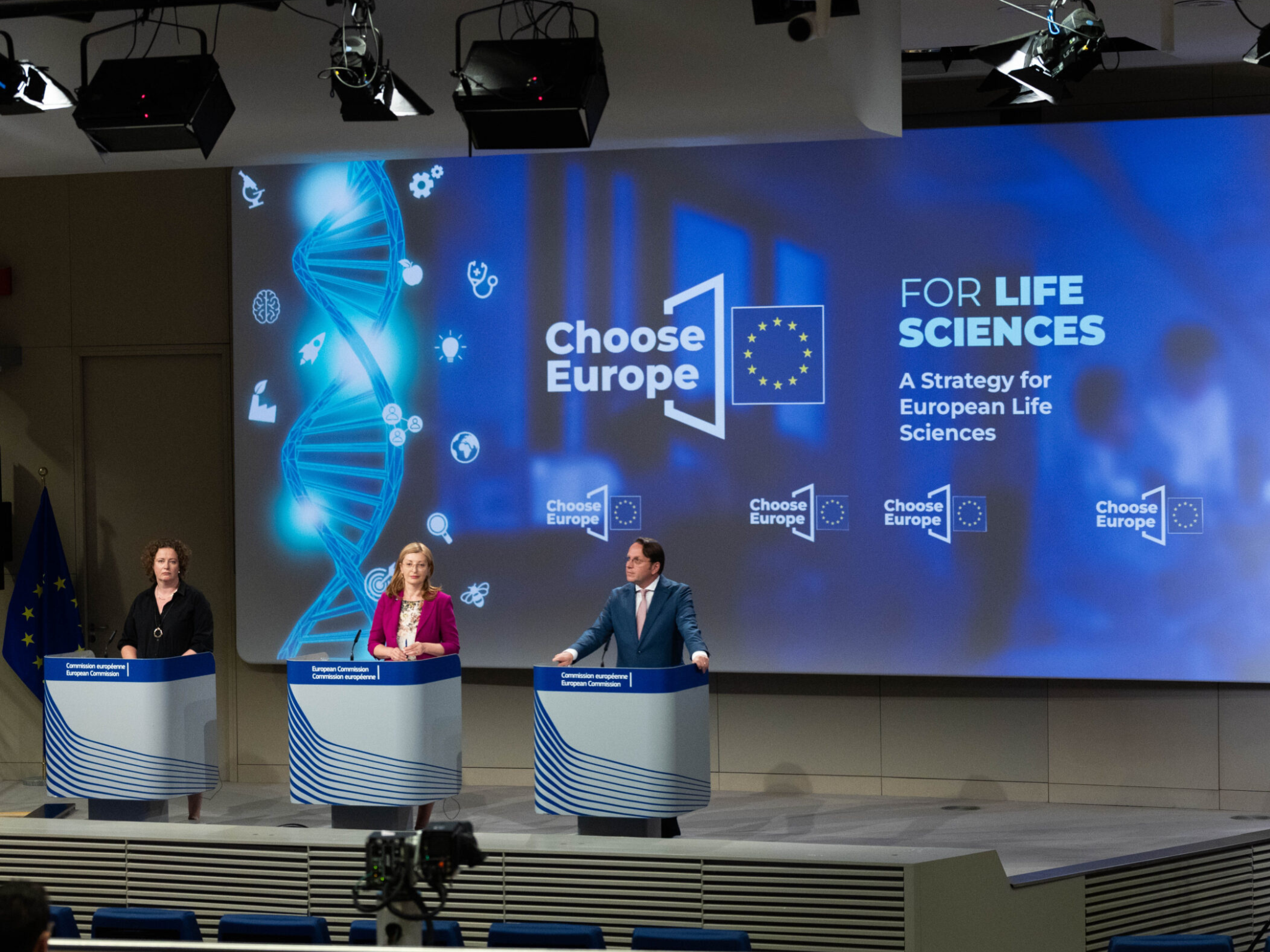
The EU Commission has set aside €350M in funding opportunities to boost food and biotech innovation, highlighting the “significant potential” of fermentation in its life sciences strategy.
Already a leader in future food funding, the EU is doubling down on the bioeconomy with its new life sciences strategy, which sets aside hundreds of millions in funding for technologies that drive industrial innovation and sustainability, and puts the fermentation sector in sharp focus.
Unveiled this week, the strategy was first announced by Commission President Ursula von der Leyen in her political guidelines, in response to Europe losing ground to global players in the life sciences sector (which involves the study of living systems).
The new plan aims to make the region the most attractive place for life sciences by 2030. The industry, the Commission said, can drive innovation in medicine, food and sustainable production, support 29 million jobs, and add nearly €1.5T in economic value.
It is backed by over €10B from the EU’s annual budget and aims to speed up innovation, facilitate market access, and build public trust in new technologies. It also proposes a Biotech Act to accelerate the approval of novel products, including cultivated meat and precision-fermented proteins.
“Science changes lives, but only if we back the people behind it. With this strategy, Europe is doing just that – funding life sciences from lab to market, supporting startups, accelerating market access, and building trust,” said Ekaterina Zaharieva, the commissioner for startups, research and innovation.
EU spotlights ‘significant potential’ of fermentation

The strategy suggests that precision and biomass fermentation technologies offer “significant potential”, since they can produce a range of high-end products from renewable raw materials with low environmental impact.
“Startups and other SMEs are playing a leading role in driving innovation in advanced fermentation technologies,” it states, before adding: “Upscaling is a capital-intensive and challenging process and requires, for example, development of biomass pre-treatment and downstream processing.”
This is why the upcoming bioeconomy strategy will “drive the deployment and uptake of such innovations across value chains while ensuring [a] sustainable supply of biomass”.
One of the Commission’s proposed actions is to support the scale-up and uptake of advanced fermentation via public-private partnerships, and the expansion of startups in this area by organising an annual conference on these technologies to connect stakeholders and promote knowledge exchange.
The Commission pointed to a recent report by McKinsey, which estimated the global fermentation market to be worth up to $150B by 2050, accounting for 4% of global protein production. Many startups in the industry use agricultural byproducts as feedstocks, helping curb food waste and lower emissions and social costs.
An AI tool to speed up novel food approval

The new strategy represents a step change in the EU’s approach to novel food regulation. It will propose the Biotech Act to “make the EU regulatory system more conducive to biotech innovation in various biotech sectors”. It intends to do so through more “innovation-friendly regulation”, regulatory sandboxes, and better mobilisation of private and public investments.
“Even with centralised approaches, long authorisation procedures under regulatory frameworks that require pre-market authorisation to ensure safety for human health and the environment can delay market entry of innovative products,” the strategy reads.
“Efforts should also be made to increase efficiency and to significantly reduce the length of authorisation procedures in the health, medical devices and food areas, to make the EU more attractive in comparison to other regions in the world.”
A study published this week found that the European Food Safety Authority’s (EFSA) novel food regulation takes an average of 2.5 years to approve new products, outlining the “need for a critical reassessment of the procedural design” of the process. The researchers called for “clearer guidance, enhanced dossier quality, and more structured pre-submission dialogue” to speed up approvals.
This is a view shared by the industry too. “Current approval processes under the novel food regulation are not sufficiently agile to keep pace with rapid innovation in fermentation,” read a recent position paper by trade body Food Fermentation Europe (FFE). “While Europe’s rigorous safety assessment is a cornerstone that we fully support, the process can be made more innovation-friendly without compromising standards.”
To help companies navigate the regulatory landscape, the EU will create an AI-powered interactive tool that will allow users to identify and access key information, datasets and tools for their specific needs. It will support researchers in embedding regulatory compliance at early design stages, overcoming data searchability barriers, and fully utilising the data service of EU-funded instruments.
EU answers industry calls with €350M commitment

The EU is already a leader in research funding for alternative proteins, collectively investing over €252M for future food research since 2020, half of which was invested in 2023 and early 2024, chiefly from its Horizon Europe programme.
The scheme set aside €50M to help scale precision fermentation and algae-based food startups in 2024. In addition, it has injected €5M in a project to create better-tasting vegan cheese via fermentation, and backed another effort to create whole-food meat analogues from upcycled ingredients and fermentation to tackle concerns around ultra-processed foods (UPFs).
In fact, the new EU life sciences strategy will seek scientific advice on UPFs to tackle the “lack of clear information about the risks and benefits” of these foods, which can create uncertainty among consumers.
Through the strategy, the EU Commission is mobilising €200M under Horizon Europe to enable researchers and businesses to work more closely together on life sciences. This investment will support the development of new sustainable innovations and improved biomanufacturing efficiency, which will directly impact companies working with fermentation and cell cultivation.
Another €150M will be made available to promote the EU’s bioeconomy leadership, presenting opportunities to scale up fermentation-derived foods.
Additionally, the EU will create a strategic research and innovation agenda to foster the development of sustainable and competitive food system solutions, providing opportunities for open-access research that can improve the taste, texture and cost of alternative proteins.
“With the incoming Danish presidency highlighting the importance of biotech in food production, momentum is building behind innovative ways to develop a more sustainable food system,” said Lea Seyfarth, policy officer at the Good Food Institute Europe. “This strategy is a step towards unlocking the EU’s potential to become an alternative protein world leader, driving growth and reducing reliance on imports.”
The move will be welcomed by the alternative protein industry. “By integrating fermentation technologies into the EU’s policy agenda, Europe can position itself as a global leader in sustainable food production, ensuring long-term economic and environmental success in the agrifood landscape,” the FFE stated in its position paper, adding that “regulatory clarity, investment incentives, and consumer trust-building efforts must go hand in hand”.
The post EU Spotlights Fermentation in Latest Strategy with €350M Funding for Biotech appeared first on Green Queen.
This post was originally published on Green Queen.